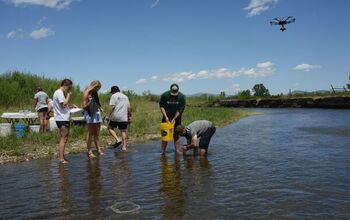NSF and Lemelson partner to support environmental and social sustainability in engineering education

NSF and Lemelson partner to support the education of engineering students on sustainability topics.
December 12, 2023
The U.S. National Science Foundation and The Lemelson Foundation have announced a new joint initiative to support the integration of environmental and social sustainability into the education of future engineers. Lemelson will provide up to $3 million over three years to support qualified engineering education projects through the NSF Research in the Formation of Engineers program.
"Engineers have an important role in addressing many grand challenges — such as infrastructure resilience, climate change and the growth of emerging industries and manufacturing — where sustainability is an essential component," said Susan Margulies, NSF assistant director for Engineering. "Engineering students want to make our world better, and the NSF-Lemelson initiative will prepare them with the interdisciplinary tools and practices they will need to address complex challenges."
To support a sustainable future, projects may focus on addressing societal challenges; developing case studies and sustainability engineering content; exploring engineering identities and beliefs about sustainability; integrating sustainability with engineering design; and other areas.
"In an era of unprecedented environmental and social challenges, the demand for climate solutions and engineers equipped with sustainability skills has never been greater. The Lemelson Foundation's Engineering for One Planet (EOP) initiative is a transformative force in engineering education — working with educators, students, industry and other funders to prepare all engineers to contribute to a more livable and equitable planet," shares Rob Schneider, executive director of The Lemelson Foundation. "In collaboration with NSF, we are excited to accelerate efforts to foster a new generation of engineers who can not only address complex technical challenges, but who also understand and prioritize the human and environmental implications of their work."
Information about the special funding opportunity is available in the Dear Colleague Letter for the initiative: NSF-Lemelson Initiative on Environmental and Social Sustainability in Engineering Education (NSF 24-028). Proposals are accepted at any time; to be considered for funding in Fiscal Year 2024, applicants should submit proposals by April 30, 2024.
The Research in the Formation of Engineers program in NSF's Directorate for Engineering supports research to advance understanding of how professional engineers are formed. The program seeks both to deepen our fundamental understanding of the underlying processes and mechanisms that support professional formation and to demonstrate how professional formation is or can be accomplished. Ultimately, the program aims to transform the engineer-formation system to foster an innovative and inclusive engineering profession for the 21st century.
For more than 70 years, NSF has recognized the central role that partnerships play in achieving the United States' research and development objectives. To learn more about NSF's partnership activities, visit nsf.gov.
-NSF-
Media Contacts
Media Affairs, NSF, (703) 292-7090, media@nsf.gov
Vanessa Briseño, The Lemelson Foundation, (310) 502-4965, vanessab@lemelson.org
About The Lemelson Foundation
The Lemelson Foundation uses the power of invention to improve lives. Established by prolific U.S. inventor Jerome "Jerry" Lemelson and his wife Dorothy in the early 1990s, and guided today by the Lemelson family, the foundation believes invention can solve many of the biggest economic, social and environmental challenges of our time. A private philanthropy located in Portland, Oregon, and operating globally, The Lemelson Foundation has provided over $300 million in grants and other investments to hundreds of organizations around the world. For more information, visit www.lemelson.org.
About Engineering for One Planet
EOP is a collaborative initiative — powered by The Lemelson Foundation — that aims to transform engineering education to equip future engineers with the skills and knowledge they need to protect and improve our planet and our lives. Recognizing the growing professional demand for engineers with expertise in climate action, social equity and environmental sustainability, EOP works with educators, students, industry and other funders to integrate sustainability principles and practices across engineering curricula. By fostering a new generation of engineers who are not only technically skilled but also socially and environmentally conscious, EOP is paving the way for a more sustainable and equitable future for all. Learn more at www.engineeringforoneplanet.org.
The U.S. National Science Foundation propels the nation forward by advancing fundamental research in all fields of science and engineering. NSF supports research and people by providing facilities, instruments and funding to support their ingenuity and sustain the U.S. as a global leader in research and innovation. With a fiscal year 2023 budget of $9.5 billion, NSF funds reach all 50 states through grants to nearly 2,000 colleges, universities and institutions. Each year, NSF receives more than 40,000 competitive proposals and makes about 11,000 new awards. Those awards include support for cooperative research with industry, Arctic and Antarctic research and operations, and U.S. participation in international scientific efforts.
Connect with us online
NSF website: nsf.gov
NSF News: nsf.gov/news
For News Media: nsf.gov/news/newsroom
Statistics: nsf.gov/statistics/
Awards database: nsf.gov/awardsearch/
Follow us on social
Twitter: twitter.com/NSF
Facebook: facebook.com/US.NSF
Instagram: instagram.com/nsfgov


